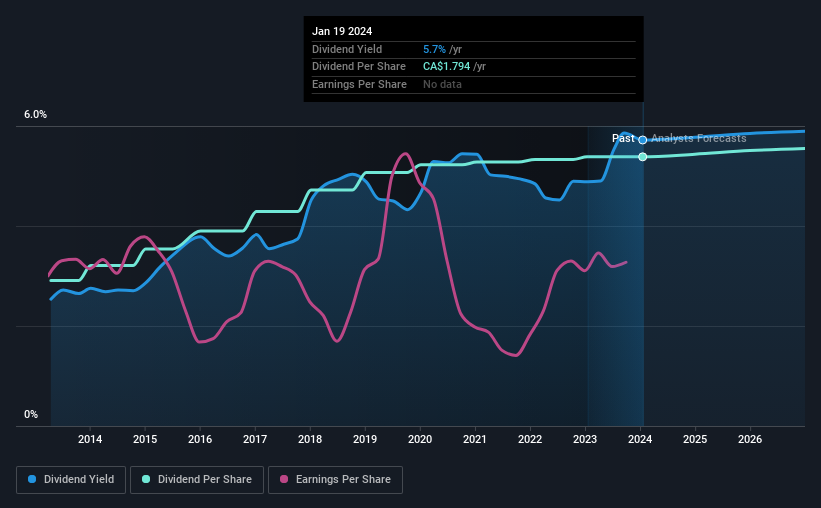- Canada
- /
- Other Utilities
- /
- TSX:CU
Canadian Utilities' (TSE:CU) Upcoming Dividend Will Be Larger Than Last Year's

Canadian Utilities Limited (TSE:CU) has announced that it will be increasing its periodic dividend on the 1st of March to CA$0.4531, which will be 1.0% higher than last year's comparable payment amount of CA$0.449. This will take the dividend yield to an attractive 5.7%, providing a nice boost to shareholder returns.
Check out our latest analysis for Canadian Utilities
Canadian Utilities' Dividend Is Well Covered By Earnings
While it is great to have a strong dividend yield, we should also consider whether the payment is sustainable. Before making this announcement, Canadian Utilities was paying out quite a large proportion of both earnings and cash flow, with the dividend being 101% of cash flows. This is certainly a risk factor, as reduced cash flows could force the company to pay a lower dividend.
Earnings per share is forecast to rise by 9.1% over the next year. If the dividend continues along recent trends, we estimate the payout ratio could reach 81%, which is on the higher side, but certainly still feasible.

Canadian Utilities Has A Solid Track Record
The company has an extended history of paying stable dividends. Since 2014, the dividend has gone from CA$0.97 total annually to CA$1.79. This implies that the company grew its distributions at a yearly rate of about 6.3% over that duration. Companies like this can be very valuable over the long term, if the decent rate of growth can be maintained.
We Could See Canadian Utilities' Dividend Growing
Investors who have held shares in the company for the past few years will be happy with the dividend income they have received. It's encouraging to see that Canadian Utilities has been growing its earnings per share at 7.2% a year over the past five years. EPS has been growing at a reasonable rate, although with most of the profits being paid out to shareholders, growth prospects could be more limited in the future.
Canadian Utilities' Dividend Doesn't Look Sustainable
Overall, we always like to see the dividend being raised, but we don't think Canadian Utilities will make a great income stock. We can't deny that the payments have been very stable, but we are a little bit worried about the very high payout ratio. This company is not in the top tier of income providing stocks.
It's important to note that companies having a consistent dividend policy will generate greater investor confidence than those having an erratic one. At the same time, there are other factors our readers should be conscious of before pouring capital into a stock. Just as an example, we've come across 2 warning signs for Canadian Utilities you should be aware of, and 1 of them is a bit unpleasant. Looking for more high-yielding dividend ideas? Try our collection of strong dividend payers.
If you're looking to trade Canadian Utilities, open an account with the lowest-cost platform trusted by professionals, Interactive Brokers.
With clients in over 200 countries and territories, and access to 160 markets, IBKR lets you trade stocks, options, futures, forex, bonds and funds from a single integrated account.
Enjoy no hidden fees, no account minimums, and FX conversion rates as low as 0.03%, far better than what most brokers offer.
Sponsored ContentNew: AI Stock Screener & Alerts
Our new AI Stock Screener scans the market every day to uncover opportunities.
• Dividend Powerhouses (3%+ Yield)
• Undervalued Small Caps with Insider Buying
• High growth Tech and AI Companies
Or build your own from over 50 metrics.
Have feedback on this article? Concerned about the content? Get in touch with us directly. Alternatively, email editorial-team (at) simplywallst.com.
This article by Simply Wall St is general in nature. We provide commentary based on historical data and analyst forecasts only using an unbiased methodology and our articles are not intended to be financial advice. It does not constitute a recommendation to buy or sell any stock, and does not take account of your objectives, or your financial situation. We aim to bring you long-term focused analysis driven by fundamental data. Note that our analysis may not factor in the latest price-sensitive company announcements or qualitative material. Simply Wall St has no position in any stocks mentioned.
About TSX:CU
Canadian Utilities
Engages in the electricity, natural gas, renewables, pipelines, and liquids businesses in Canada, Australia, and internationally.
Slight second-rate dividend payer.


